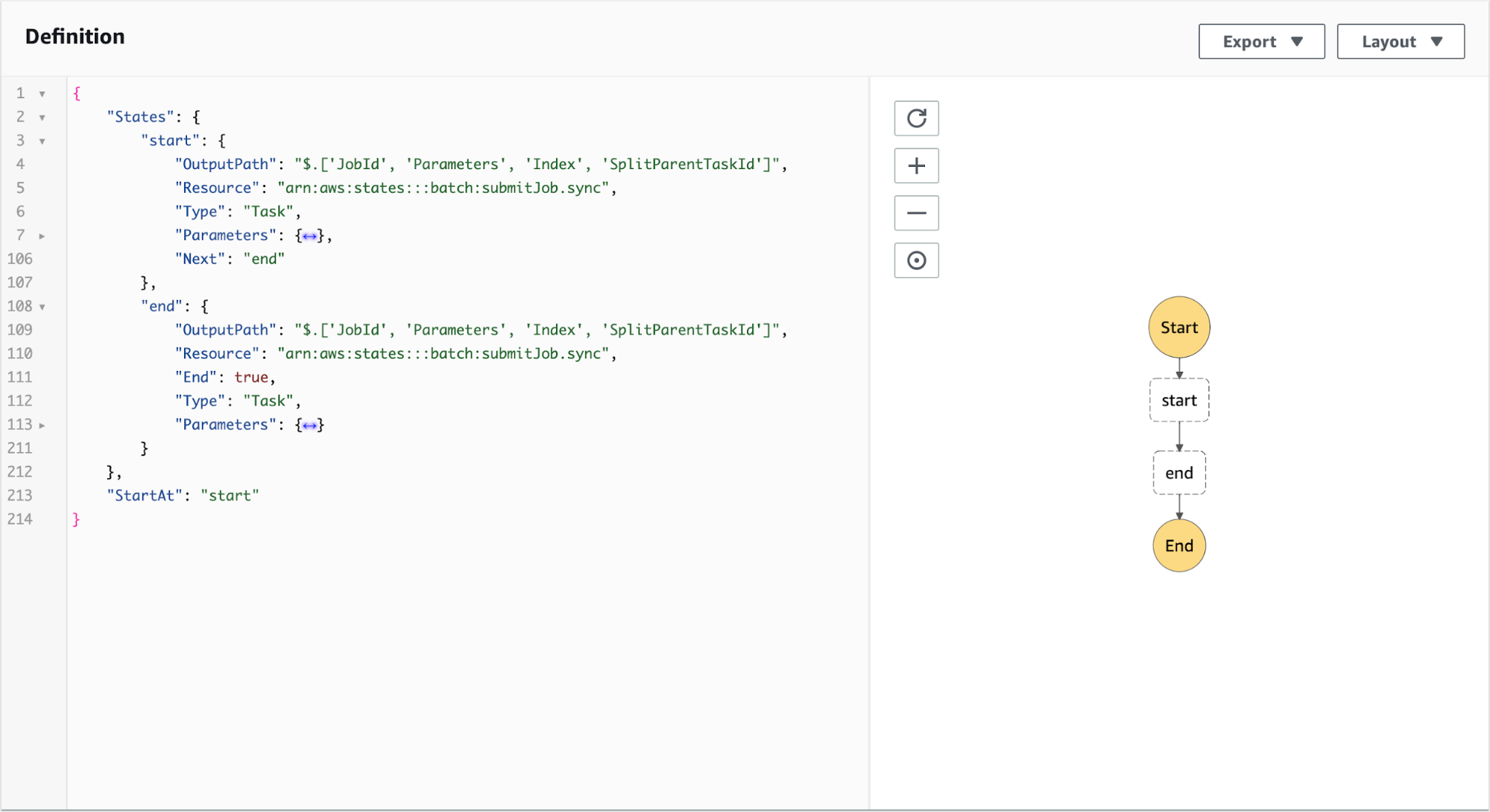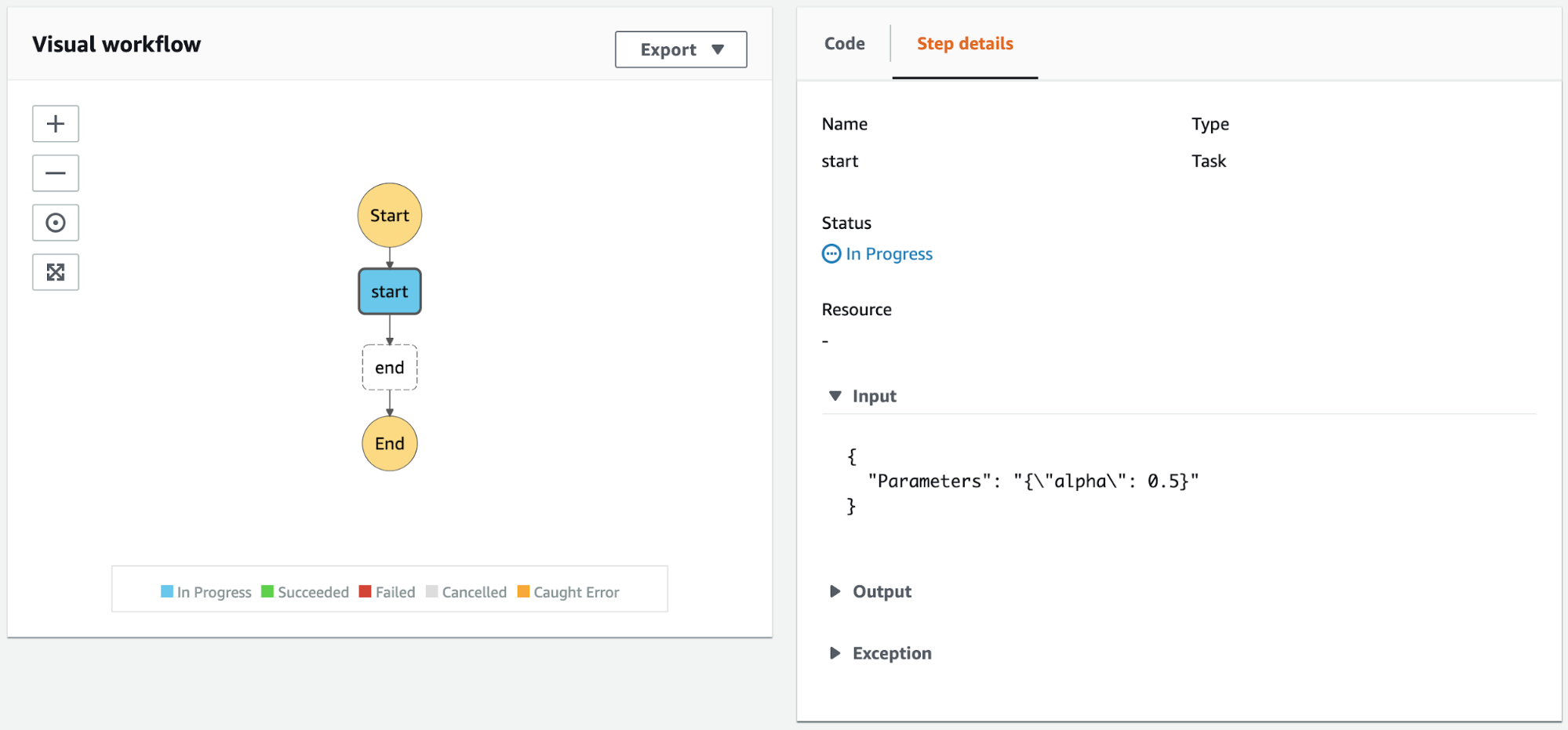Scheduling Metaflow Flows with AWS Step Functions
AWS Step Functions is a general-purpose workflow orchestrator - you can read AWS Step Functions documentation to learn all about it. If you just want to get your flow in production, this document contains everything you need to know.
In Metaflow's point of view, the main benefits of AWS Step Functions are the following:
- AWS Step Functions orchestrates workflows expressed as state machines, which are a superset of directed graphs. This means that we can map Metaflow flows to corresponding AWS Step Functions state machines fully automatically. This gives you much more detail about what gets executed and how, in contrast to treating Metaflow scripts as black boxes.
- AWS Step Functions comes with tooling that is required for running workflows in production. You can benefit from battle-hardened solutions provided by AWS for alerting, monitoring, and scheduling. By using AWS Step Functions your Metaflow flows can integrate seamlessly with the wider AWS offerings.
When running on AWS Step Functions, Metaflow code works exactly as it does locally: No
changes are required in the code. All data artifacts produced by steps run on AWS Step
Functions are available using the Client API. All tasks are run
on AWS Batch respecting the @resources decorator, as if the @batch decorator was
added to all steps, as explained in Executing Remote
Tasks.
This document describes the basics of AWS Step Functions scheduling. If your project involves multiple people, multiple workflows, or it is becoming business-critical, check out the section around coordinating larger Metaflow projects.
You can interact with Step Functions programmatically using the Deployer API - read
more about it here.
Conditional and recursive steps introduced in Metaflow 2.18, are not yet supported on Step Functions deployments. Contact the Metaflow Slack if you have a use case for this feature.
Pushing a flow to production
Let's use the flow from the section about parameters as an example:
from metaflow import FlowSpec, Parameter, step
class ParameterFlow(FlowSpec):
alpha = Parameter('alpha',
help='Learning rate',
default=0.01)
@step
def start(self):
print('alpha is %f' % self.alpha)
self.next(self.end)
@step
def end(self):
print('alpha is still %f' % self.alpha)
if __name__ == '__main__':
ParameterFlow()
Save this script to a file parameter_flow.py. To deploy a version to AWS Step
Functions, simply run
python parameter_flow.py --with retry step-functions create
This command takes a snapshot of your code in the working directory, as well as the version of Metaflow used and exports the whole package to AWS Step Functions for scheduling.
It is highly recommended that you enable retries when deploying to AWS Step Functions, which you can do easily with --with retry as shown above. However, make sure that all your steps are safe to retry before you do this. If some of your steps interact with external services in ways that can't tolerate automatic retries, decorate them with retry with times set to zero (times=0) as described in How to Prevent Retries.
The command will export your workflow to AWS Step Functions. You can also search for the flow by name within the AWS Step Functions UI. You should see a visualization of the exported flow, like here:


You can click the orange Start Execution button to execute the flow on AWS Step
Functions. It pops up a dialog asking for an input. You can specify your parameters as
an escaped JSON string with Parameters as the key - ****
{
"Parameters" : "{\"alpha\": 0.5}"
}
Metaflow automatically maps Parameters of your flow to corresponding parameters on AWS Step Functions.
After you click Start Execution on the Input dialog, AWS Step Functions starts running the flow:

In this case, the run should succeed without problems. If there were errors, you could reproduce them locally as explained in Debugging with Metaflow.
You can trigger the workflow through command line as well:
python parameter_flow.py step-functions trigger --alpha 0.5
If you run step-functions create again, it will create a new version of your flow on
AWS Step Functions. The newest version becomes the production version automatically
(due to the consistency guarantees provided by AWS Step Functions, it might be a couple
of seconds before this happens). If you want to test on AWS Step Functions without
interfering with a production flow, you can change the name of your class, e.g. from
ParameterFlow to ParameterFlowStaging, and step-functions create the flow under a new
name or use the
@project
decorator.
Note that step-functions create creates a new isolated production
namespace for your production flow. Please
read Organizing Results to learn all about namespace behavior.
In case your flow doesn't accept any parameters, and you would like to execute it from within the AWS Step Functions UI, you would need to pass in the following in the input dialog box:
{
"Parameters" : "{}"
}
Limiting the number of concurrent tasks
By default, Metaflow configures AWS Step Functions to execute at most 100 tasks concurrently within a foreach step. This should ensure that most workflows finish quickly without overwhelming your AWS Batch queue, the execution backend.
If your workflow includes a large foreach and you need results faster, you can increase
the default with the --max-workers option. For instance, step-functions create
--max-workers 500 allows 500 tasks to be executed concurrently for every foreach step.
This option is similar to run
--max-workers that is used to
limit concurrency outside AWS Step Functions.
Deploy-time parameters
Since Metaflow 2.13, Metaflow provides a new construct, Config, that
offer more versatile approach to configuration than deploy-time parameters.
Take a look at Configuring Flows
for more information.
You can customize AWS Step Functions deployments through Parameters that are evaluated
at the deployment time, i.e. when step-functions create is executed.
For instance, you can change the default value of a Parameter based on who deployed the
workflow or what Git branch the deployment was executed in. Crucially, the function in
Parameter is evaluated only once during step-functions create and not during the
execution of the flow.
You can run the flow locally as usual. The function inside Parameter is called only once when the execution starts.
from metaflow import FlowSpec, Parameter, step, JSONType
from datetime import datetime
import json
def deployment_info(context):
return json.dumps({'who': context.user_name,
'when': datetime.now().isoformat()})
class DeploymentInfoFlow(FlowSpec):
info = Parameter('deployment_info',
type=JSONType,
default=deployment_info)
@step
def start(self):
print('This flow was deployed at %s by %s'\
% (self.info['when'], self.info['who']))
self.next(self.end)
@step
def end(self):
pass
if __name__ == '__main__':
DeploymentInfoFlow()
When step-functions create is called, deployment_info is evaluated which captures
your username and the time of deployment. This information remains constant on AWS Step
Functions, although the user may override the default value.
The context object is passed to any function defined in Parameter. It contains various
fields related to the flow being deployed. By relying on the values passed in context,
you can create generic deploy-time functions that can be reused by multiple flows.
Scheduling a flow
By default, a flow on AWS Step Functions does not run automatically. You need to set up a trigger to launch the flow when an event occurs.
On Step Functions, Metaflow provides built-in support for triggering Metaflow flows through time-based (cron) triggers, which, as the name implies, triggers the workflow at a certain time. As of today, [event-based triggering] (/production/event-triggering) is not supported on Step Functions.
Time-based triggers are implemented at the FlowSpec-level using the @schedule
decorator. This flow is triggered hourly:
from metaflow import FlowSpec, schedule, step
from datetime import datetime
@schedule(hourly=True)
class HourlyFlow(FlowSpec):
@step
def start(self):
now = datetime.now().strftime('%Y-%m-%d %H:%M:%S')
print('time is %s' % now)
self.next(self.end)
@step
def end(self):
pass
if __name__ == '__main__':
HourlyFlow()
You can define the schedule with @schedule in one of the following ways:
@schedule(weekly=True)runs the workflow on Sundays at midnight.@schedule(daily=True)runs the workflow every day at midnight.@schedule(hourly=True)runs the workflow every hour.@schedule(cron='0 10 * * ? *')runs the workflow at the given Cron schedule, in this case at 10am UTC every day. You can use the rules defined here to define the schedule for the cron option.
Reproducing failed production runs
Let's use DebugFlow from the debugging
section as an example. The flow
contains a bug in the step b. When you run it, the failed run will look like this on
the AWS Step Functions UI:

-0fa449301236d6773f122388d74743a0.png)
Notice the execution ID of 5ca85f96-8508-409d-a5f5-b567db1040c5. When running on AWS
Step Functions, Metaflow uses the AWS Step Functions execution ID (prefixed with sfn-)
as the run id.
The graph visualization shows that step b failed, as expected. First, you should
inspect the logs of the failed step to get an idea of why it failed. You can access AWS
Batch step logs in the AWS Step Functions UI by looking for the JobId in the Error
blob that can be accessed by clicking on the Exception pane on the right side of the
UI. You can use this JobId in the AWS Batch console to check the job logs. This
JobId is also the metaflow task ID for the step.
Next, we want to reproduce the above error locally. We do this by resuming the specific AWS Step Functions run that failed:
python debug.py resume --origin-run-id sfn-5ca85f96-8508-409d-a5f5-b567db1040c5
This will reuse the results of the start and a step from the AWS Step Functions run.
It will try to rerun the step b locally, which fails with the same error as it does in
production.
You can fix the error locally as above. In the case of this simple flow, you can run the
whole flow locally to confirm that the fix works. After validating the results, you
would deploy a new version to production with step-functions create.
However, this might not be a feasible approach for complex production flow. For instance, the flow might process large amounts of data that can not be handled in your local instance. We have better approaches for staging flows for production:
Staging flows for production
The easiest approach to test a demanding flow is to run it with AWS Batch. This works even with resume:
python debug.py resume --origin-run-id sfn-5ca85f96-8508-409d-a5f5-b567db1040c5 --with batch
This will resume your flow and run every step on AWS Batch. When you are ready to test a fixed flow end-to-end, just run it as follows:
python debug.py run --with batch
Alternatively, you can change the name of the flow temporarily, e.g. from DebugFlow to
DebugFlowStaging. Then you can run step-functions create with the new name, which will
create a separate staging flow on AWS Step Functions. You can also use the
@project
decorator.
You can test the staging flow freely without interfering with the production flow. Once the staging flow runs successfully, you can confidently deploy a new version to production.